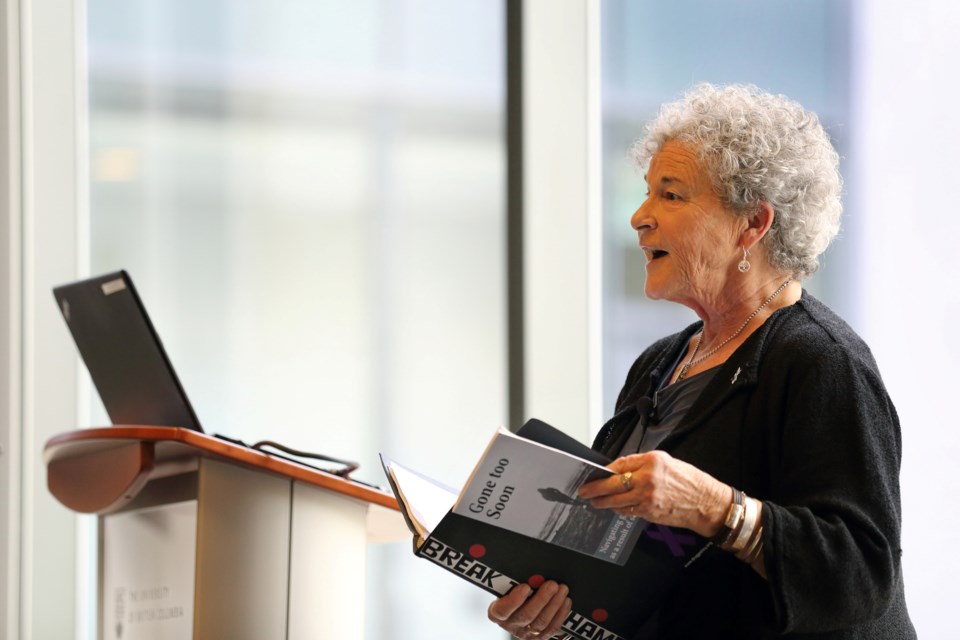Drug overdoses have killed 972 people in B.C. so far this year, according to the most recent statistics.
But what do schools and education have to do with the opioid overdose crisis?
A lot, according to a recent event hosted by the University of British Columbia Faculty of Education.
Schools can help remove stigma, change the language used about addiction and, most crucially, build resilience and other strengths in students, three noted panelists told the audience at the Frankly Speaking event on Sept. 22.
Leslie McBain, who lost her 25-year-old son Jordan to an overdose in 2014, said there are many things she wished she had learned before he died.
“I wish I’d known deeply what addiction is — how it looks, how it feels, how it manifests,” McBain said. “Because then I wouldn’t have been so hard on my son at that time… We all need education on addiction.”
Changing the language is a powerful tool for changing stigma, she said. Words like “junkie” stigmatize people who use drugs.
“Words do change culture and then they change our ideas,” she said. “We need to check our own stigma at every turn.”
Brad Baker is the district principal of Aboriginal education and safe and caring schools in the North Vancouver School District. He’s a member of the Squamish Nation and the son of a residential school survivor. Three members of his family have died from overdoses in the past two years, he said.
Although statistics show opioids are not commonly used by students in the Kindergarten to Grade 12 system, Baker said schools still need to get ahead of the issue. To do that, he said, young people need more knowledge.
“It’s our responsibility as educators to talk about the good, the bad and the ugly,” Baker said.
To turn the tide, a focus on awareness about mental health, social-emotional skills and drug prevention.
The best way to do that is to make sure students have an attachment to their school and feel a sense of belonging there, he said.
“It’s all about relationships. Relationships are key,” Baker said. “We’ve got to be able to tackle the issue head on. We can’t be afraid of this.”
Kenneth Tupper, the director of implementation and partnerships at the B.C. Centre on Substance Use, and a UBC adjunct professor, said the opioid crisis is a failure of public policy over the last 150 years and that simply prohibiting drugs doesn’t work.
“Drugs are cheaper, more plentiful and more easily available,” Tupper said.
His solution is policy change, but he said educators can make a significant difference.
“Number one is to promote resilience-based educations. Number one for that is connectedness with a caring adult,” Tupper said.
Janet Fraser, chair of the Vancouver School Board, was at the event and asked the speakers how to get parents who might be reluctant to talk about sex and drugs involved in these conversations in schools.
Baker said in North Vancouver the consistency of the dialogue between teachers and parents makes a difference.
“It’s the teacher… not giving up on the communication piece. It’s not the one-off phone call… it’s the consistency, which may include knocking on the door,” Baker said. “The parents may not feel safe going into the school. Anytime you come to a difficult conversation about your child you don’t want to do it in the four walls of a school. There has to be other opportunities for those conversations.”
People in the audience raised other key issues such as poverty, trauma, unaddressed learning differences such as dyslexia or attention deficit hyperactivity disorder, and bullying. Educators in the room spoke about efforts, such as the new curriculum or social-emotional learning, designed to address some of those problems.
McBain said her son had mild dyslexia and borderline ADHD.
“If I were to put my finger on anything, I don’t know, but there was certainly stress there and his self-esteem was certainly affected by not having those things attended to,” McBain said.
Her son was popular, well-connected and strong, she said.
“It’s dangerous to generalize that every person who becomes addicted has a mental health problem. I think addiction becomes a mental health problem, but it isn’t across the board,” she said.
So, what’s the takeaway for parents and educators? Good tips are to keep the lines of communication open, check your own stigma and try to teach resiliency, social-emotional health and mental health literacy.
Tracy Sherlock writes about education and social issues for the Courier. Reach her at [email protected].



